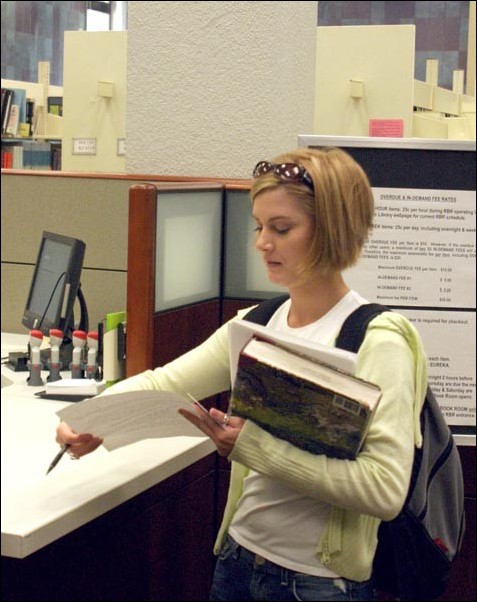Required books often not needed
Image: Required books often not needed:Students like Kim Parker can check out textbooks from the Library’s Reserve Book Room for two-hour periods.:John Grix/State Hornet
March 2, 2005
Every semester, students spend hundreds of dollars for books that are supposed to be required to pass their classes.
With resources like the University Library, It&s not uncommon for a student to purchase an $80 book at the beginning of the semester, only to sell it back to the Hornet Bookstore for less than half the original purchase price without having ever read a single chapter.
&Professors put books on their required list and they&ll only use them for a week out of the semester,& said Sacramento State senior Vicki Hill. &Sometimes you end up spending $60 to $100 on a book you don&t really need and end up selling it back for half of what you paid for it.&
Some books listed as required reading in the bookstore at the beginning of the semester turn out to be merely recommended by professors.
Professors& teaching styles are another factor in determining whether buying a book is necessary.
&It depends on who&s teaching the class,& junior Tony Vicari said. &Some teach with lecture notes that give you all the information you need to pass.&
Professors& style of lecturing from an outline of the text often provides students with enough information to pass exams on their own or with only an occasional glance at the actual book itself.
Although the lecture format allows for learning without reading, it&s not necessarily the intent of the instructor to discourage students from reading textbooks.
Bonnie Kay, professor of communication studies, says the lectures she gives are supplementary to the reading.
&It&s important to read the text, as well as taking notes,& she said. &If you&re only doing one or the other, you&re only getting your information from a single channel. Besides, textbooks are expensive. If you&re required to buy them, you might as well use them,& Kay said.
For some students, the solution is to avoid buying books all together. But Kay says it&s necessary to receive information from multiple channels, or sources, in order to be able to think critically and retain information.
Students who learn solely from lectures are only memorizing the amount of information necessary to pass a multiple-choice exam. Students who aren&t willing to pay $80 for a paperback textbook often use alternative means of obtaining the information.
One solution can be the campus library&s reserve section where teachers frequently place copies of their required textbooks.
Students can check the books out for a couple of hours to do any necessary studying. Keeping the book for extended periods of time isn&t an option, but if it&s not necessary to read on a daily basis, the time restriction shouldn&t be a problem.
Junior Adriann Coley takes advantage of the reserve section of the library.
&Last semester I had a class I didn&t buy books for,& she said. &Two trips to the library, and I got an A.&
Students are also using the Internet as an alternative to reading books. Web sites like Barnes and Noble&s Sparknotes.com provide paraphrased and condensed versions of books similar to the popular &Cliffs Notes.& Some books& full text are even available for free on the site.
Sparknotes.com&s materials are intended to supplement reading, according to the site but in a pinch it can help students get the information they need if the actual book is unavailable.
Some textbooks also have their own Web sites, with supplementary information like chapter outlines and study guides.























































































































